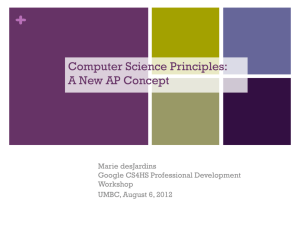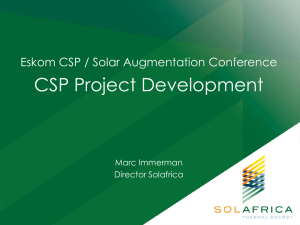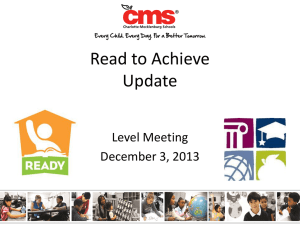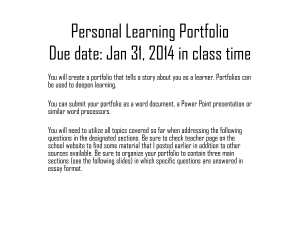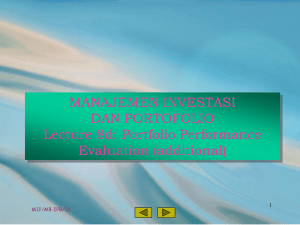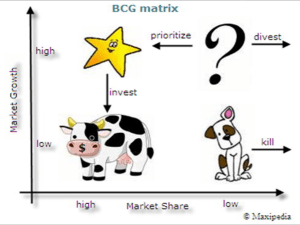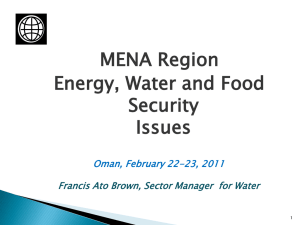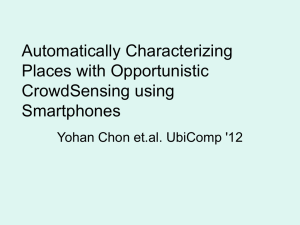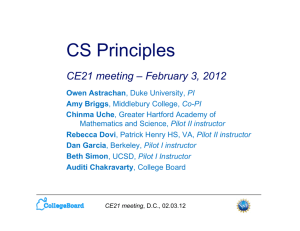to ppt file - CSTA
advertisement
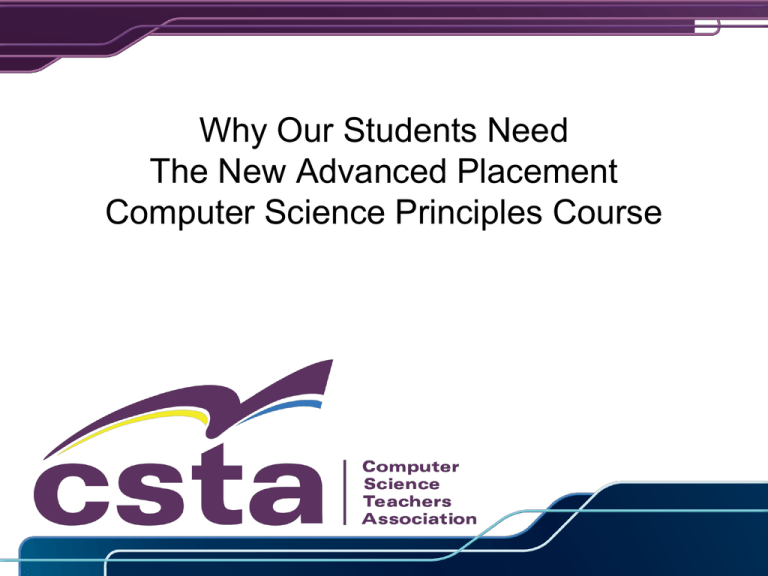
Why Our Students Need The New Advanced Placement Computer Science Principles Course Knowledge of, passion for, and skills with computer science will help all students whatever their career goals: Physician Artist Software Engineer Welder Scientist Entrepreneur Musician President AP Computer Science Principles embraces the entire field, not simply programming It is an AP course: designed to be accessible to every student while building knowledge and skills that are endorsed by colleges and universities Computational Thinking & Big Ideas Some of the foundation of AP CS Principles: Communicating Collaborating Developing Creativity Algorithms Internet Impact Kidney Exchange Algorithms Nobel Prize Winner Al Roth of Stanford University http://www.bbc.co.uk/news/magazine-20004050 http://nyti.ms/Y3sHNL Big Data and Cancer Research Cancer Team Trains Computer to Evaluate Breast Cancer http://med.stanford.edu/ism/2011/november/computer.html Daphne Koller of Stanford University Human Computation Luis von Ahn solves problems by having people use computers. He leverages crowdsourcing to help translate the web into other languages and to digitize old books and newspapers. Luis von Ahn of Carnegie Mellon University See Bits&Bytes: http://nsf.gov/cise/csbytes/newsletter/vol1i1.html Crisis Response As part of Google.org's Crisis Response team, Raquel Romano builds tools to provide information to people after a disaster that is interpretable, accurate and up-to-date. Raquel also volunteers her time on Google Flu Trends, which is used by the CDC anticipate flu outbreaks and efficiently allocate resources. Raquel Romano of Google See YouTube: http://www.youtube.com/watch?v=_YwZEDU9bkA Chinese Translation A new translation technique called Deep Neural Networks can take a user’s spoken English word, translate it into Mandarin Chinese, and then plays the translation in the user’s own voice. Rick Rashid of Microsoft. Watch demonstration at: http://research.microsoft.com/apps/video/default.aspx?id=175450 Knowledge and Skills Knowledge of Computer Science is essential for a cyberenabled and cyber-capable citizenry Focusing student learning on using technology enables them to be consumers of technology. Teaching them how to create new technology enables them to be designers, innovators, and problem solvers. Where Will the STEM Jobs Be? Computing and mathematics is one of the TOP 10 fastest growing major occupational groups 20102020. 150,000+ job openings in computing annually. 1 in every 2 STEM jobs will be in computing in 2020. Degrees and Jobs in the US Knowledge, Jobs, Opportunities The new Advanced Placement Computer Science Principles (CSP) course offers students a chance to begin to explore their interests, to achieve college credit or placement (reducing tuition costs), and prepare for the jobs of the future What is AP Computer Science Principles? • Will be a College Board Advanced Placement course in 2016-2017 • Designed to be rigorous, engaging, and effective in targeting all students, across all demographics • Will have been piloted for six years before exam year, pilots started in 2010, unprecedented acceptance from both high schools and colleges/universities • Enthusiastic support from industry and professional partners • Portfolio assessment encourages collaboration Why Focus on Advanced Placement CS? • AP has national recognition and so offers the opportunity to impact students in schools across the country • Offering the AP CSP course will allow school administrators to raise the academic profiles of their schools • AP CSP has a proven curriculum framework, facilitates alternate ways to implement the curriculum, AP audit process ensures reliability Why Focus on AP CS? • AP CSP has no computer science pre-requisites, can lead to further study, can earn college credit and/or placement • AP CSP helps prepare students for many (or all!) disciplines, not just those in STEM fields • AP CSP encourages (and requires!) collaboration, emphasizes problem-solving, has the potential to excite students to apply knowledge and continue to learn Built on Big Ideas • Computing is a creative activity • Abstraction reduces information and detail to facilitate focus on relevant concepts • Data and information facilitate the creation of knowledge • Algorithms are used to develop and express solutions to computational problems • Programming enables problem solving, human expression, and creation of knowledge • The Internet pervades modern computing • Computing has global impacts Focuses on Computational Thinking Practices Connecting computing Developing computational artifacts Abstracting Analyzing problems and artifacts Communicating Collaborating Course Pilot Timeline: Phase I 2009–2010: Course framework developed 2010–2011: Pilot 1 at five universities Prototype test item development 2011–2012: Pilot 2 at 8 universities and 10 high schools Prototype test administration 2012–2013: Pilot 3 at 2 universities and 4 high schools Used performance tasks in portfolio based assessment (requiring collaboration) Course Pilot Timeline: Phase II 2013–2014: 40–50 pilot schools (40 high school, 10 college) Portfolio prototype and test administration, Portfolio development and refinement 2014–2016: Continue with Phase II pilot (possibility to add more schools) Portfolio prototype and test administration, Portfolio development and refinement 2016 - 2017: Assessment delivered Professional Development Timeline There are several groups working to prepare and deliver professional development opportunities for CS Principles. Information about where to find out about these offerings is at the end of this presentation. The College Board is working on the following timeline: 2013–2017: 2015–2017: Teacher support development College Board PD offering Assessment development Course audit development 2016–2017: PD development Teacher support offering Course audit open Assessment • May combine traditional fixed-response questions and portfolio tasks • Administered as a computer-based assessment • Portfolio assessment may require to students to: • Explore and research a specific topic related to the Internet and • • • • • • computing Investigate and manipulate a large dataset to answer questions Submit executable programs Perform work in collaboration with another student Submit written reflections Interpret and present their ideas in a written work Submit discussion of collaboration Solutions • Share the information with parents: jobs, opportunities, ability to make a difference in every discipline • Meet with policy makers and provide information to help them understand what computer science is and why it is important • Help principals identify ways to fit the AP CSP into their school schedules (replacing an outdated tech course, allowing CS to count as a math credit, etc.) • Enable teachers to attend the large number of professional development events focused on the AP CSP • Use new resources to help students better understand what computer science is and why it is cool What You Can Do Right Now • Apply to be a pilot school under the current NSF grant: - check www.csprinciples.org - http://collegeboard.org/csprinciples • Offer the course in your school so that teachers and staff will be ready when the course becomes an official AP course: - review resources from previous and current pilot sites at: www.csprinciples.org/home/resources/lessons • Attend local and national professional development events: - www.csprinciples.org/home/pd - csta.acm.org/ProfessionalDevelopment/sub/TeacherWorkshops.html - cs10kcommunity.org Information Links Course Information: www.csprinciples.org www.collegeboard.com/html/computerscience Resources: www.csta.acm.org/Resources/sub/BrochuresPostersVideos.html http://www.ncwit.org/programs-campaigns/counselors-computing-c4c Professional Development: http://cs10kcommunity.org/ THANK YOU! Add contact info here
